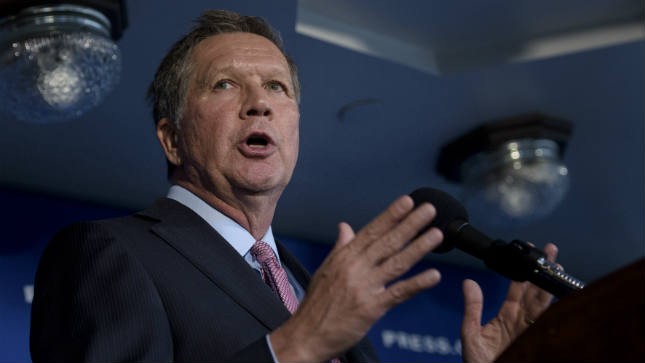
Ohio Gov. John Kasich on Tuesday detailed a national security strategy meant to showcase his firm stance against terrorism and an ability to take the reins on foreign policy.
Speaking at the National Press Club in Washington, D.C., the GOP presidential candidate called for immediate action in response to the terrorist attacks in Paris.
“Unless we want to see bloodshed in America, we need to get serious immediately about dealing with this threat,” the Ohio Republican said. “There can be no negotiating with this darkness, we must simply defeat it.”
“I believe America is exceptional. It is simply a statement of the obvious. We’re exceptional because of our uniqueness,” he added to applause. “It’s not someone else’s job nor is it our job alone. We can fix this.”
Kasich is one of several presidential candidates who in the days following the Paris attacks is highlighting his executive experience and national security credentials.
But he was quick to note that he doesn’t want the Paris attacks to be used as political gain for any candidate.
“I didn’t think it was appropriate to be injecting a political campaign into what the world’s experiencing,” Kasich told reporters after his speech, adding that he recently cut a line about his experience on the House Armed Services Committee from a recent speech.
“We have to be careful that we don’t use this as opportunity by anybody … to advance a candidacy,” Kasich continued. “Let’s get through this period of time and then over time, it’ll be appropriate what experience means when we’re talking about commander in chief of the United States of America.”
When asked if the shift to national security will weaken the candidacies of political outsiders like retired neurosurgeon Ben Carson and real estate mogul Donald Trump, Kasich instead criticized President Obama’s approach to handling of the Islamic State in Iraq and Syria (ISIS), which has claimed credit for the Paris attacks.
On Monday, Kasich joined more than two dozen governors who said they wouldn’t permit new Syrian refugees into Ohio.
“In the state, we don’t have authority. We can only express our concerns,” Kasich said Tuesday, referring to whether he has the constitutional authority to bar refugees from settling in the Buckeye State.
“Sometimes I’m criticized for having a big heart, and I do have a big heart, but I have a pretty good brain,” Kasich continued. “We just have to have a system that can determine who these people are. And at the current time we can’t, and we have to be very careful.”
Prior to the Paris attacks, Kasich said that the U.S. had “some of the responsibility” for allowing refugees into the country, but reversed course after the carnage in Paris.
He released a statement a day after the attacks calling for an international coalition, saying that, as president, he would “immediately summon an emergency meeting at the highest level to begin working with our European, Turkish, and Sunni Arab allies to contain and ultimately defeat ISIS in its homeland.”
Kasich expanded on that statement Tuesday, explaining that the coalition should include NATO partners and regional allies, also noting that “an air campaign is not enough."
When it comes to boots on the ground, Kasich said he isn’t interested in “nation building.”
Kasich instead called for additional support to the Kurds in Syria and Iraq and “arm them much more generously.”
“I don’t think you can deal with ISIS by just looking the other way,” Kasich said. “We all get tired of war, but at end of day, leaders have to rally the public to a cause that’s great.”
Kasich also reiterated his call for no-fly zones from early last month.
“We must create safe havens protected by no-fly zones,” he said, adding that these “sanctuaries” would be located on the Turkish and Jordanian border. He said allies in this area “should provide protection for them on ground while the United States provides protection from the air.”
He also said he’ll establish a new agency that will have a “clear mandate to promote core Judeo-Christian, Western values that we and our friends and allies share” that will focus primarily on the Middle East, China, Iran and Russia and develop “sophisticated strategies” to communicate with each “target” country.
- Publish my comments...
- 0 Comments
